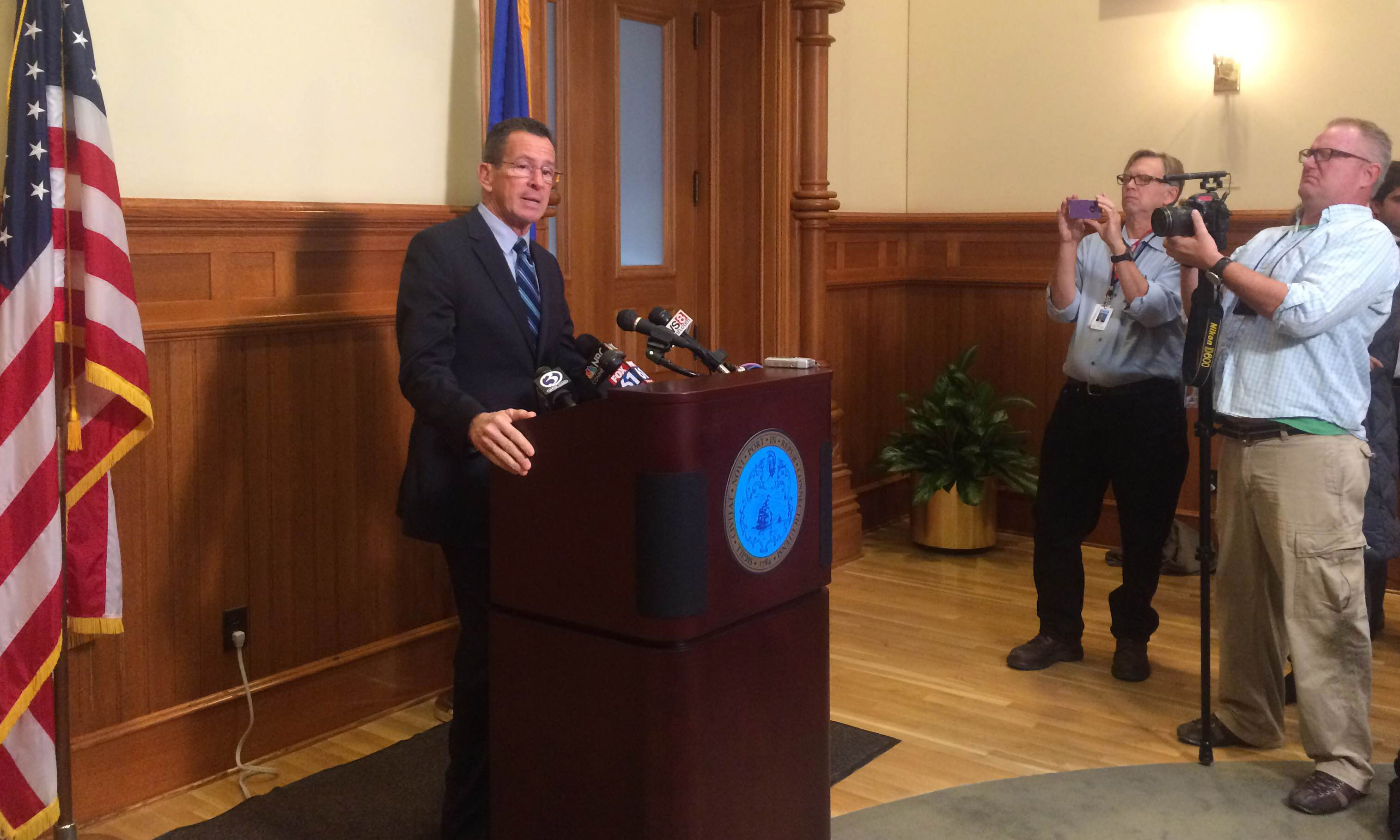
With the country reeling after a terror attack killed 14 people in San Bernardino, California earlier this month, Gov. Dannel Malloy announced Thursday that he intends to sign an executive order that would ban individuals on federal terrorist watch lists from purchasing firearm permits in the state of Connecticut.
In an address from the White House Sunday night, President Barack Obama called on Congress to pass legislation ensuring that those on the federal no-fly list would be prohibited from purchasing firearms, a call that Democratic leaders have repeated over the week. Malloy’s announcement, the first of its kind in the country, comes in response to a national debate over gun rights in the wake of the San Bernardino shootings and a November attack on a Planned Parenthood Clinic in Colorado that killed three.
“Like all Americans, I’ve been horrified by the recent terrorist attacks in California and Paris, and this should be a wake-up call for all of us,” Malloy said in a Thursday press conference in Hartford. “This is a moment to seize here in America, and today I’m here to say that in Connecticut, we are seizing this moment.”
Malloy described the executive order as “common sense” and “sensible,” echoing a rhetorical theme in Democrats’ calls for gun control.
Malloy said that his administration has been in “direct” contact with federal authorities over his decision. Because the terrorist watch list is a federal list, Malloy said he will only promulgate the executive order if federal authorities give him permission to access the list.
David Kopel, a former law professor at New York University, characterized Malloy’s executive order as a “unilateral action,” in the sense that he is bypassing the procedures that would normally be conducted by the state legislature.
“The governor is not the lawmaker,” Kopel said.
In fact, Kopel mentioned that New Jersey governor and 2016 Republican presidential candidate Chris Christie took a similar course of action earlier in 2013, when he signed a host of bills tightening gun control in New Jersey. Christie’s bills also called for the disqualification of people on the federal terrorist watch list from owning guns.
William Vizzard, a criminal justice professor at California State University, Sacramento, said the executive order’s primary significance is symbolic. The executive order, he said, is intended to force the Republican Party into the hypocritical position of not opposing gun ownership for suspected terrorists — even after the Republican Party itself “whipped up terrorism fears and accused Democrats of doing nothing about the risks.”
Malloy’s executive order may fuel backlash on two sides — from those opposed to restrictions on gun ownership and those concerned about civil liberties.
Connecticut groups opposed to gun control swiftly responded to Malloy’s announcement. A statement from gun-rights organization Connecticut Carry described the proposal as “despicable and unconstitutional” for its violation of due process and Second Amendment rights. The statement added that a federal executive order banning those on the terrorist watch list from buying guns might affect up to 1 million people.
“The governor does not have the constitutional authority to deny a state and federal constitutional right,” Connecticut Carry Legal Director Edward Peruta said in the statement. “A firearm purchased for us in the home is a core constitutional right and shall not be infringed by Malloy or his mentor Barack Obama.”
Scott Wilson, president of the Connecticut Citizens Defense League, said in a statement that the executive order may lead to illegal seizures of guns by federal authorities. The ACLU, Wilson added, has recognized that the lists are unconstitutional and disproportionately target Muslims and people of color.
In an interview with the News, Wilson said the CCDL is considering the possibility of challenging Malloy’s executive order in court.
“There’s no plans at this time yet to file a lawsuit about the imminent executive order, but we are looking to see what language actually gets presented,” he said. “At this point, we’re essentially weighing options … but if he follows through then it will be challenged.”
Kopel said the secret nature of terrorist watch lists may raise constitutional questions about Malloy’s action.
“I don’t think it is ever reasonable for the government to act on secret blacklists to take people’s constitutional rights away,” Kopel said. “If there were some procedure where people had a fair hearing with the government having the burden of proof, that might be a different thing. But that is not how these blacklists are created.”
The legality of no-fly lists has come in question before. In a 2014 lawsuit filed by the American Civil Liberties Union, a federal court ruled that the no-fly list violates the due process rights of American citizens, though the court declined to end the program. Since the ruling, the ACLU has continued to criticize the secrecy and opaqueness of the no-fly list.
Data from the Federal Bureau of Investigation shows that 2,043 gun purchases nationwide between 2004 and 2014 were by people on a federal watch list.







